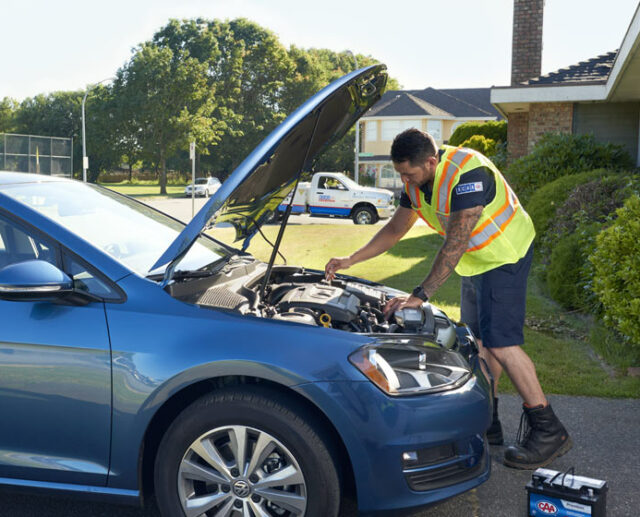Wednesday June 30, 2021 | VICTORIA, BC
by Jalen Codrington | Island Social Trends | Editor: Mary P Brooke
Nothing ruins a road trip vacation like a broken-down car. With temperatures soaring, it’s important to check the safety of your vehicle before heading out for the Canada Day long weekend, says the BC Automobile Association (BCAA).
With less travellers leaving the country for holiday destinations, BC has been marked with an increase in inter-provincial travel. This of course, will be putting plenty of pent-up demand on BC Ferries. Unfortunately, breakdowns are quite common at the terminals, or onboard the ferries.
We’ve all been in the lineup, and had to be rerouted around that poor unfortunate soul whose car won’t start. His shoulders are scrunched up as he vainly tries to turn the engine over. In his panic, he’s doing all he can not to make eye contact with the hundreds of irritated people driving past him. Nobody wants that to be that guy.
Island Social Trends spoke with Josh Smythe, BCAA’s automotive manager, to garner some travel tips for this long weekend.
Battery life
Smythe advises never using the car battery while the engine is off. Particularly with efforts to maintain social distancing, more people are choosing to stay inside their vehicles onboard vessels and at the terminals. This poses a problem – passengers aren’t allowed to idle their vehicles on the ferry, so will instead elect to keep their cars in the on-position to charge devices and listen to music, which wears down the battery charge. Smythe says even something as minor as depressing the brakes to activate the taillights can be enough to kill the battery.
“With the heat, people want to have their windows open, maybe fiddle on their iPad…so that will drain a battery very rapidly,” said Smythe.
Of course, BC Ferries crewmembers are prepared for such breakdowns, with booster packs to charge batteries, or vehicles to tow you off the ship should that prove fruitless. But regardless, this still leaves you in a predicament.
Hot vehicle interiors
BCAA also reminds drivers to be careful when travelling with children and pets. Smythe advises leaving pets at home if possible; and to never, ever leave a child or any living thing in a parked vehicle – even in moderately warm weather, beneath the shade, or on ferry decks.
“Leaving your pets inside the vehicle is not a good plan…something as simple as 23 degrees, 10 minutes later in a closed car is now 32 degrees. And it rapidly increases from there.”
Tire pressure
Smythe recounted a story of a British Columbian driving a boat trailer from Vancouver to Vernon, who blew a tire just outside Kelowna. After a 14-hour wait, specialty equipment arrived to install a new tire. The man continued his trip, and was only about 20 minutes from his destination, when his other tire blew. And of course, most people don’t carry two spares.
“You drive for 2-2.5 hours in 45-degree weather, that asphalt is way warmer than 45 degrees. It’s warming the tires, the heat creates pressure, it pressurizes the [tire] air, and your PSI climbs,” said Smythe.
Fuel in the heat
“The heat wreaks havoc on fuel pumps,” said Smythe. “If you get to a half a tank, refill it. It’s the gas that cools the fuel pump, so if you’re running it low, there’s a good chance that fuel pump can die.”
BCAA also offers these standard safety tips for travel:
- Have your trusted mechanic check the level and concentration of engine coolant and top up as necessary. Check your owner’s manual to find the correct coolant type and strength for your vehicle.
- Ensure the air conditioner is blowing cold air. If it’s not, you might want to get it checked for leaks, or it may require a flush.
- Change your oil regularly to help prolong your engine’s life. Check your owner’s manual for when the service intervals should be.
- Check the age and strength of the battery. Heat is harder on a tired cell than cold. A five-year-old battery is usually nearing retirement.
- Ensure tires are properly inflated and in good condition. Replace them if they’re cracked or low on tread. Don’t forget the spare.
- Keep the gas tank more than half full. This will keep the fuel cool and not overwork your alternator.
- Use folding sunshades when parked to lower the temperature inside the vehicle.
- Slow down on the road. This saves gas and reduces the likelihood of the engine overheating.
- Be prepared for a breakdown. Carry water, food, a fully charged phone and some type of portable shade, such as a hat or umbrella. In case you have to call for help, dial 1.800.222.4357 for BCAA Roadside Assistance.






